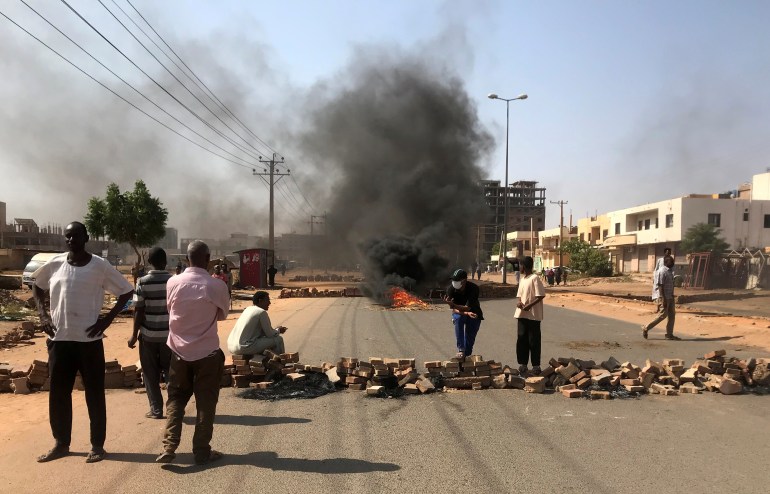International reactions have continued, rejecting Al-Burhan's measures, by dissolving the Sovereignty Council and the Ministers and imposing a state of emergency in Sudan, and most Arab and African capitals demanded a return to the transitional phase.
White House deputy spokeswoman Karen Jean-Pierre stressed the United States' rejection of the Sudanese army's actions, and called on it to immediately release the prime minister and other officials who have been placed under house arrest.
She stressed in a media briefing that Washington will continue to assist and support the Sudanese people to achieve democracy in the country.
US State Department spokesman Ned Price also announced the suspension of $700 million in aid to Sudan, stressing that any forceful change of the civilian government would jeopardize bilateral relations between the two countries, as he put it.
For its part, the US Embassy in Khartoum condemned what it called the measures that undermine the democratic transition in Sudan, and the embassy called on those it called the actors who obstruct Sudan’s transition to step down and allow the transitional government, led by civilians, to continue its important work to achieve the goals of the revolution.
The US special envoy to the Horn of Africa, Jeffrey Feltman, had expressed concern about reports of the army's control of the government in Sudan, and said that any change of the transitional government by force would put US aid at risk.
Protesters block roads in Khartoum (Reuters)
global rejection
United Nations Secretary-General Antonio Guterres condemned what he described as the military coup in Sudan. Spokesman for the Secretary-General, Stephane Dujarric, said that Guterres calls for the immediate release of Prime Minister Abdalla Hamdok and all those arbitrarily detained.
In Europe, the Commissioner for Foreign Policy in the European Union, Josep Borrell, called on partners and regional states to put the transitional process in Sudan back on track.
In a tweet on Twitter, European Council President Charles Michel strongly condemned what he called the attempted coup in Sudan, and called on all parties to ensure the safety of the Prime Minister and civilian leaders.
The European Union's spokeswoman for foreign affairs, Nabila Al-Masrali, said that the situation in Sudan was changing rapidly, and that there was a need to stop the violence, release detainees, and preserve what she called the historic transition there.
French President Emmanuel Macron also condemned what he called the attempted coup in Sudan, and affirmed his support for the transitional government.
The British Foreign Office considered that there is an increased risk of a possible deterioration of the situation in Khartoum and other areas.
The German Foreign Minister also said that what he called the coup attempt must be ended immediately, and German Foreign Ministry spokeswoman Andrea Zasse called on all those responsible for security and order in Sudan to respect the will of the people, and stressed the need to end the attempt to overthrow the government immediately, she said.
For its part, the Turkish Foreign Ministry announced its aspiration for the Sudanese parties to adhere to the commitments stipulated in the constitutional declaration and not to boycott the transitional process.
On the other hand, the Russian Foreign Ministry said that the events in Sudan are evidence of a severe crisis in the country in the political and economic fields as a result of a failed policy during the past two years, and added that the transitional authorities ignored the despair experienced by the majority of the Sudanese people.
arabic and african invitations
On the other hand, the African Union Commission called for the release of all political leaders in Sudan and a return to dialogue.
The Ethiopian Foreign Ministry said that it supports the completion of Sudan's transition to democracy, respect for the constitutional document for the transitional period, and stressed the need to respect the aspirations of the Sudanese people and not to interfere in their internal affairs.
In the Arab world, the Kingdom of Saudi Arabia said that it is following with concern and great interest the current events in Sudan, and called for the importance of restraint, calm and non-escalation, and called for preserving all the political and economic gains that have been achieved, and everything that aims to protect the unity of the ranks among all political components in Sudan. .
The State of Qatar affirmed that it is following with concern the current developments in Sudan, and called on all parties not to escalate, contain the situation, prevail the voice of wisdom, and work in the interest of the Sudanese people towards stability, justice and peace.
The Qatari Ministry of Foreign Affairs expressed Qatar's aspiration for the need to return the political process to the right track, in order to achieve the aspirations of the Sudanese people.
Algeria also expressed its deep concern about the developments in the situation in Sudan, and a statement of the Ministry of Foreign Affairs said that Algeria calls on all parties, civil and military, to resort to dialogue.
The Egyptian Foreign Ministry said that Foreign Minister Sameh Shoukry discussed with the US envoy to the Horn of Africa the latest developments in Sudan.
It is noteworthy that the head of the Sudanese Sovereign Council, Abdel Fattah Al-Burhan, declared a state of emergency in the country and suspended some articles of the constitutional document, in a step that followed measures that included the arrest of the Prime Minister, members of his government and other officials, which the Ministry of Information described as a “integrated military coup.”

